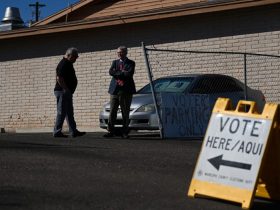In its new poll of voters in Wisconsin, the Marquette Law School Poll did something unusual, a sort of inversion of the approach pollsters had been taking over the past few months. In addition to asking whom people preferred between the two major-party candidates, Vice President Kamala Harris and former president Donald Trump, it also asked whom people would prefer if President Joe Biden had remained in the race.
This was not a response to Trump’s recent suggestion on social media that Biden somehow plans to regain the nomination, perhaps a bit of wish-casting on the Republican’s part. Instead, it offers a comparison between what is and what was, in the same way that polling before Biden withdrew often asked about a Trump-vs.-Harris race to compare what was (at the time) with what might be (and now is).
Among likely voters, Harris has a four-point lead in Wisconsin (before respondents were pushed to pick between the two candidates). Were the race still Trump against Biden, Biden would be trailing by three points — a seven-point swing.
This is not a perfect comparison, certainly, given that people’s views of Biden and a Biden-Trump race are necessarily colored by the events of the past few weeks. But when we dig into the numbers a little further, we see that there are shifts that probably capture a fundamental change in the race.
For months before his withdrawal from the race, Democrats fretted that Biden simply wasn’t seeing the support from younger voters that he needed. Younger voters soured on Biden fairly early in his presidency, and presidential polling reflected that apathy. As with independents and non-White voters — groups that overlap more with younger Americans than older ones — Biden was underperforming past Democrats, including himself in 2020.
In Marquette’s poll, the biggest difference between support for Biden and support for Harris was among younger respondents and demographic categories into which younger voters fall. Among those under 30, Harris does 11 points better than Biden and Trump does five points worse, a 16-point shift. Harris narrows the gap among those ages 30 to 44 by 11 points. Among independents, Harris does 10 points better; among independents who lean Democratic — a group into which many younger voters fall — she does 13 points better.
Exit polls in 2020 had Biden beating Trump by 23 points among Wisconsin voters under 30. Harris leads Trump by 30 points with that group now, while a Biden-Trump contest would give the president only a 14-point advantage.
This mirrors a widening gap among younger voters nationally. In YouGov polling conducted for the Economist, Harris led Trump by 13 points shortly before Biden withdrew. In the most recent poll, she leads Trump by 31 points. (The graph below indicates the days when YouGov’s polls were being conducted.)
An analysis of the national vote by Pew Research Center after the 2020 election found that Biden beat Trump among voters under 30 by 24 points nationally.
Again, a shift among younger voters is crucially important to Harris. The difference between the results in 2016 and 2020 can be attributed to the decreased density of older voters in the electorate in the latter contest. And while younger voters still express less enthusiasm about voting in November than do Americans overall, the fraction of voters under 30 who say they are enthusiastic about doing so went from a quarter to a third over the past month.
There are plenty of caveats here, certainly, of which you probably don’t need to be reminded. The election is months away, Harris’s campaign is still new, polling has been off the mark at times in recent years, etc. These polls, though, reflect the sort of change that Democrats wanted and need to see to prevent Trump from regaining the presidency.








